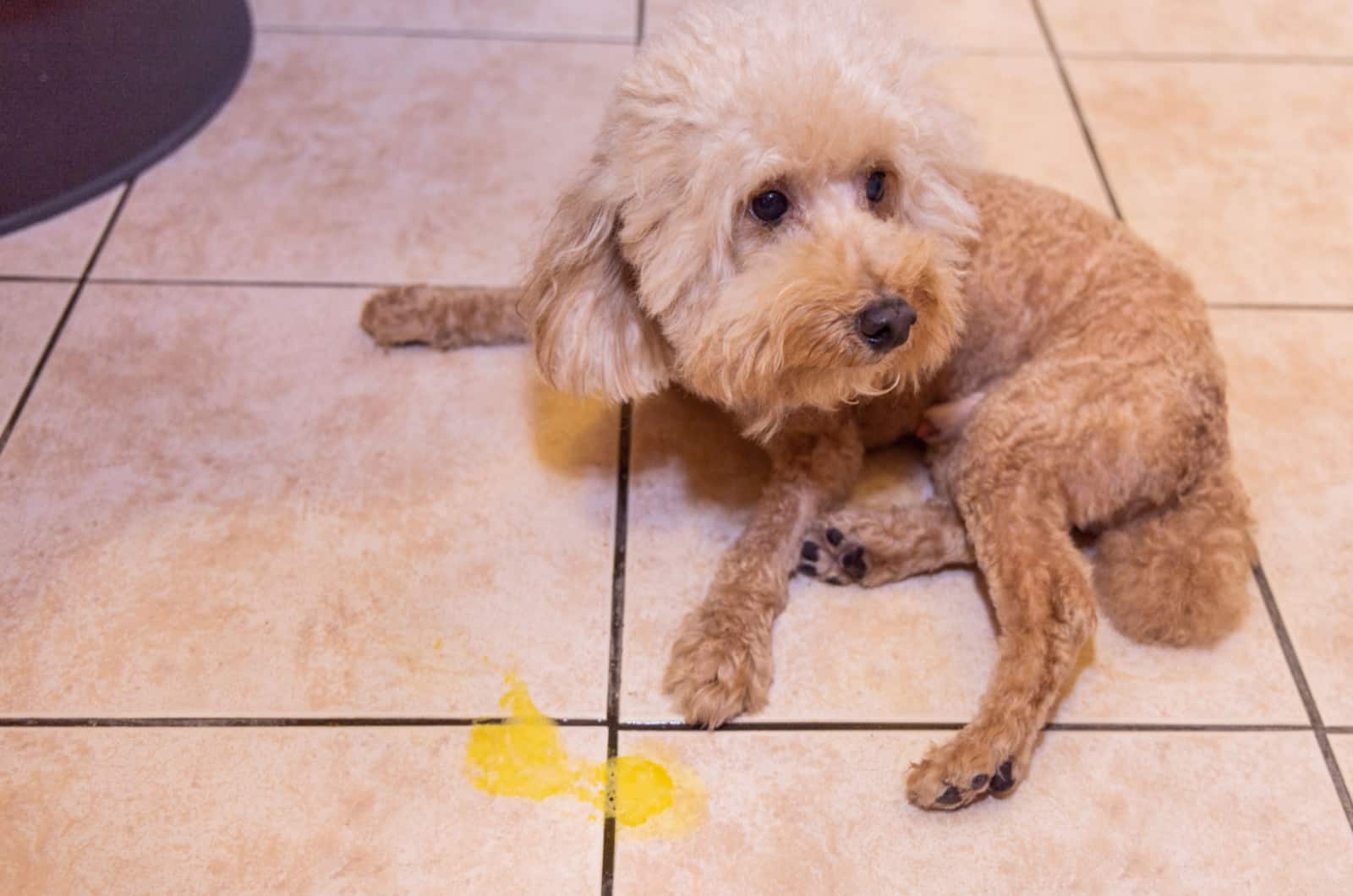Help! Why is my dog throwing up yellow?
Okay, calm down. I know this is frightening, but there’s really nothing to worry about. Better out, than in, right? Well, that’s absolutely right!
When something bothers your dog in its gastrointestinal system, he will throw it up. Afterward, your Fido will feel great again.
But, what causes throwing up in the first place? What is that yellow foamy stuff? Should I rush to the vet’s office and demand some blood tests to begin with?
There’s really no need to panic immediately. You should always monitor your dog after something he unexpectedly does, like vomiting.
That yellow foam might be a sign that he’s not feeling well at the moment, but it will go by. Still, if it repeats more than a few times, I’d call in for a checkup.
As I always say, it’s better to prevent something from happening if you can. Your dog throwing up yellow bile can happen, but it also doesn’t have to.
Just to be safe, let’s check out why your dog can throw up yellow, and how to treat vomiting!
Why Is My Dog Throwing Up Yellow?
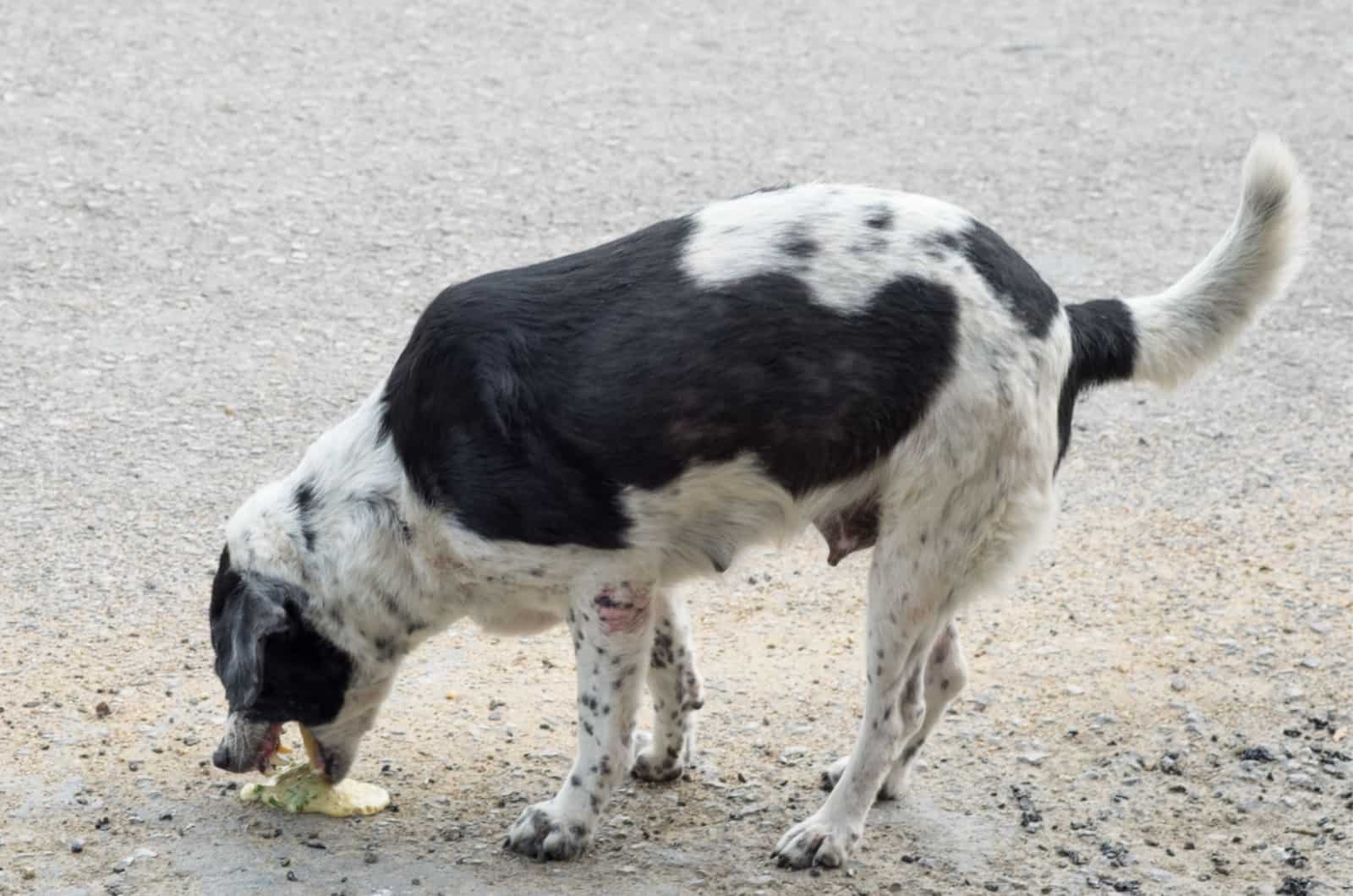
The answer to this question is a complex one. We can’t immediately tell why a dog is vomiting yellow bile. First, we need to figure out what causes throwing up.
The underlying reasons may be some situations that your dog has found himself in or symptoms of severe health conditions.
Usually, vomiting is a result of swallowing a foreign body, but it can also be a side effect of taking in some food that doesn’t suit the dog (dietary indiscretion), or conditions like gastroenteritis, parvovirus, gastritis, etc.
Let’s check out the most common causes of a dog vomiting up yellow bile.
Empty Stomach
One of the common causes of vomiting bile is an empty stomach.
If the vomiting usually happens in the morning, you can easily suspect that an empty stomach is the cause of vomiting.
There is a significant pause between last night’s dinner and the following morning’s breakfast. Dogs usually go for more than 12 hours without food throughout the night. This could irritate their tummy and cause vomiting.
An empty stomach should only occasionally cause vomiting of yellow foam. If it continues, you should seek a vet’s help.
Dietary Indiscretion
Dogs are prone to developing pica, a condition known for eating all sorts of non-food items. This can lead to intestinal blockage, and have your dog throwing up yellow bile.
Items that are usually consumed because of pica are rocks, toys, house items like spoons, etc. A dog’s love for socks is also well-known.
However, dogs are also prone to eating grass, especially when they feel they’re lacking some nutrients in their food. When a dog eats grass, he’ll most likely throw it up later, along with bile. Dogs aren’t meant to eat grass, and it’s only natural for them to vomit it later because it will irritate their stomach linings.
Food Allergies
Just like humans, dogs can be allergic to some foods. These food allergies are usually connected with ingredients that humans like to consume.
Of course, some things are strictly off limits for dogs, i.e., chocolate, poppy seeds, garlic, etc.
But, did you know that dairy products, eggs, wheat, soy, fish, pork, beef, and lamb can trigger food allergies in dogs? Grains are especially known for triggering reactions.
Allergic reactions to certain items usually show up immediately upon consumption. Still, it’s possible for a dog to react to some ingredients for up to year five of its age.
If your dog likes stealing your cat’s food, that could also cause reactions.
Severe allergies can cause symptoms like heavy breathing, rashes, and even vomiting yellow foam.
Heatstroke
Long exposure to high temperatures can cause heat stroke and severe problems for your dog.
Extreme temperatures are not suitable for dogs. Don’t take them out for their daily walk when it’s boiling hot outside. Also, avoid car rides under such temperatures if possible. Car rides and high temperatures can only result in dog panting and vomiting.
What Is That Yellow Stuff My Dog Vomits?
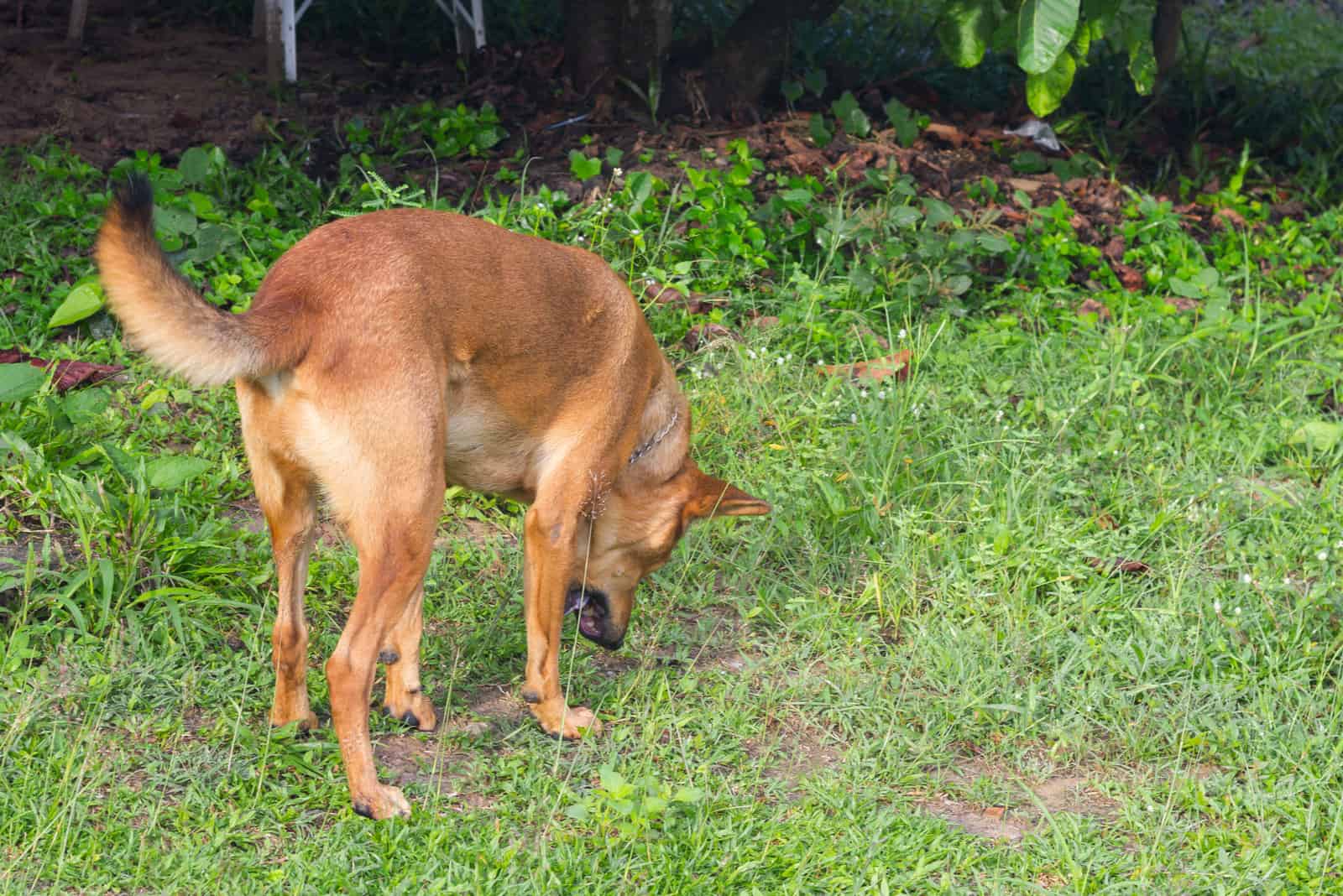
I know that seeing your dog vomiting can be stressful in the first place. No dog owner likes seeing that, especially if your dog is gagging and not vomiting. But, that’s really not a reason to panic as long as your dog is exhibiting normal behavior (other than throwing up).
It’s important to keep your cool and react according to the situation. Of course, seeing that yellow stuff for the first time can disturb a human.
What even is that gunk in the first place? Vomiting food and some other items that a dog swallows is pretty common. But, what about yellow substances?
Well, that awful yellow substance is actually bile, which is a product of the dog’s liver and gallbladder.
How about we figure out how bile works, and how it’s made?
You see, yellow bile is a result of recycling red blood cells, which get converted into something called bilirubin. This process happens inside the liver. Then, bilirubin travels through the bile ducts to the gallbladder and helps break down dietary fats.
Bile acts like a strong alkaline. It will neutralize the acid in your dog’s stomach. Also, bile will protect the lining of the small intestine, which is quite sensitive.
A big chunk of cake goes to the pyloric sphincter. It closes and allows the stomach content (which is acidic) to pass into the duodenum. If the sphincter doesn’t close, it will release bile into the stomach, where it causes a reaction with the stomach acid.
Naturally, dogs will then vomit in order to empty their stomach of this irritating bile.
Can Yellow Vomit Be A Symptom Of Severe Health Conditions?
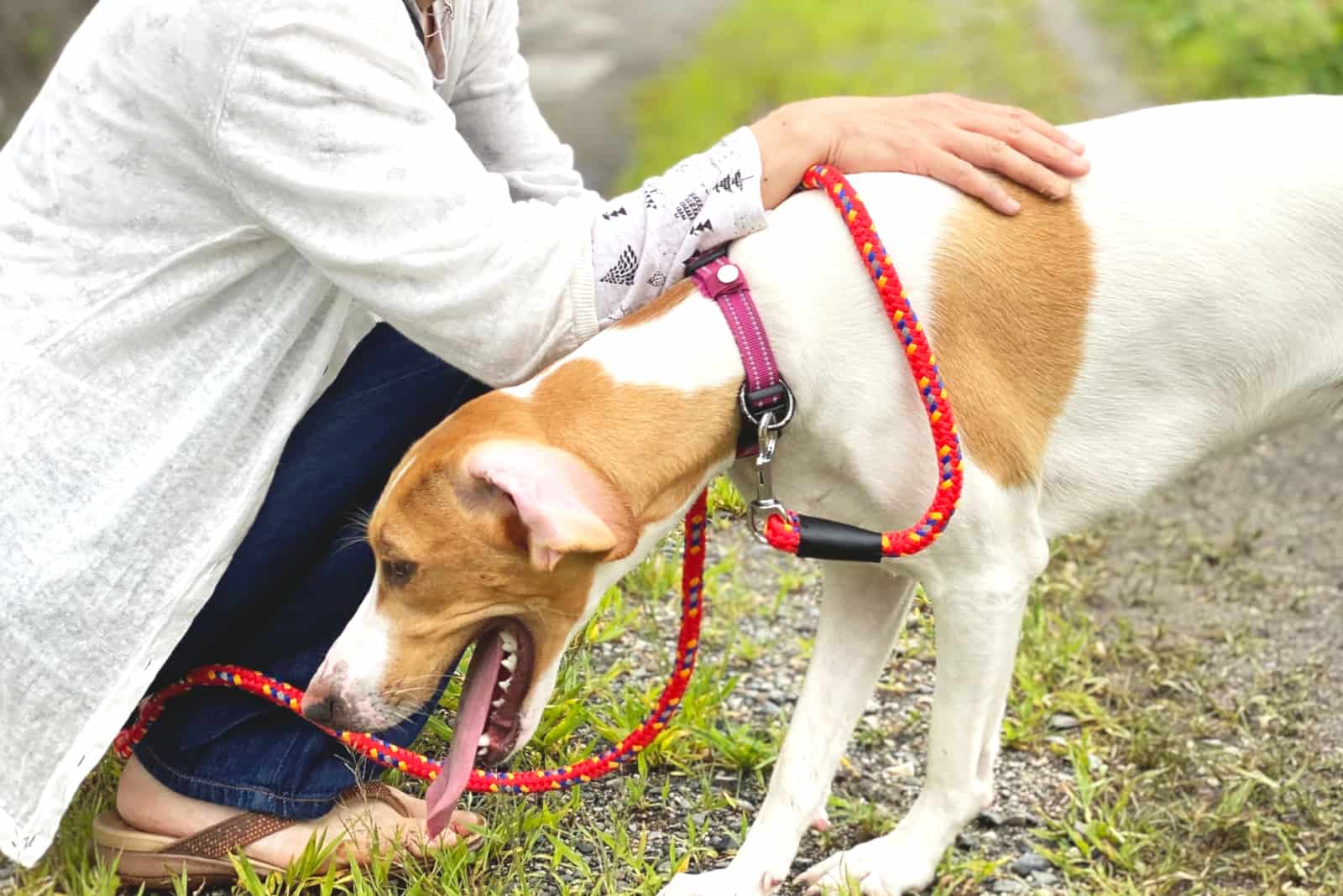
If your dog keeps vomiting yellow, it could be a clear sign that something is wrong, and your dog is suffering from some kind of condition.
Some conditions linked to vomiting yellow bile aren’t that severe, but they still require treatment.
On the other hand, there are conditions that should worry you, and must be treated immediately upon diagnosing them.
Now, we’ll discuss the most common underlying causes of your dog’s yellow vomit.
Gastrointestinal Problems
You can suspect that your dog is having gastrointestinal problems if he has some other symptoms. You can’t just suspect that Fido is having severe issues with his gastrointestinal tract if he vomits once or twice, and shows no other symptom.
Usually, yellow vomit induced by these problems brings along other problems like lethargic behavior, depression, lack of appetite, runny stools, dehydration, yellow gums or eyes, weight loss, etc.
These symptoms may tell you that your dog is having problems with canine ulcers, parasites, liver conditions, inflammatory bowel disease, and in some severe cases, gastrointestinal cancers.
Pancreatitis
There’s a good reason why we shouldn’t feed our pups fatty foods. Dogs find it too difficult to digest, and often show problems after eating greasy meals.
For example, you should never let your dog share a cheeseburger with you, or feed him fatty bits of raw meat while preparing a meal.
These kinds of food will cause your dog’s pancreas to become inflamed. The abdomen will become rock-hard and painful, while your dog might exhibit other symptoms like diarrhea.
If you suspect your dog is having pancreatitis, you should contact your DVM as soon as possible.
What Is Bilious Vomiting Syndrome?
Bilious Vomiting Syndrome (or BVS) is a rare condition, but you shouldn’t stress out too much about it. BVS is not life-threatening. It does require medical help, but your dog won’t be in danger.
But, what is BVS?
This condition is characterized by your dog vomiting after not eating for quite a while, i.e., the interval between dinner and breakfast. The dog will vomit yellow bile, but he won’t vomit food.
Usually, some dogs experience fluid accumulation in their stomach after not eating for a while. The fluid will travel back from the intestines to the stomach, cause irritation, and then your dog will vomit.
Bilious Vomiting Syndrome has symptoms like nausea and lethargic behavior.
Luckily, as I said, it’s a condition you shouldn’t worry about. BVS can be treated with simple things like a change of diet, and the introduction of more meals throughout the day. However, the number of calories given throughout the day shouldn’t go over the recommended amount.
Some experts say giving your dog an extra meal before bedtime will also help fight BVS.
In case these tricks fail, your vet will prescribe a medication, i.e., antacids that should do the trick and stop this syndrome.
What Is Acid Reflux, And Does My Dog Have It?
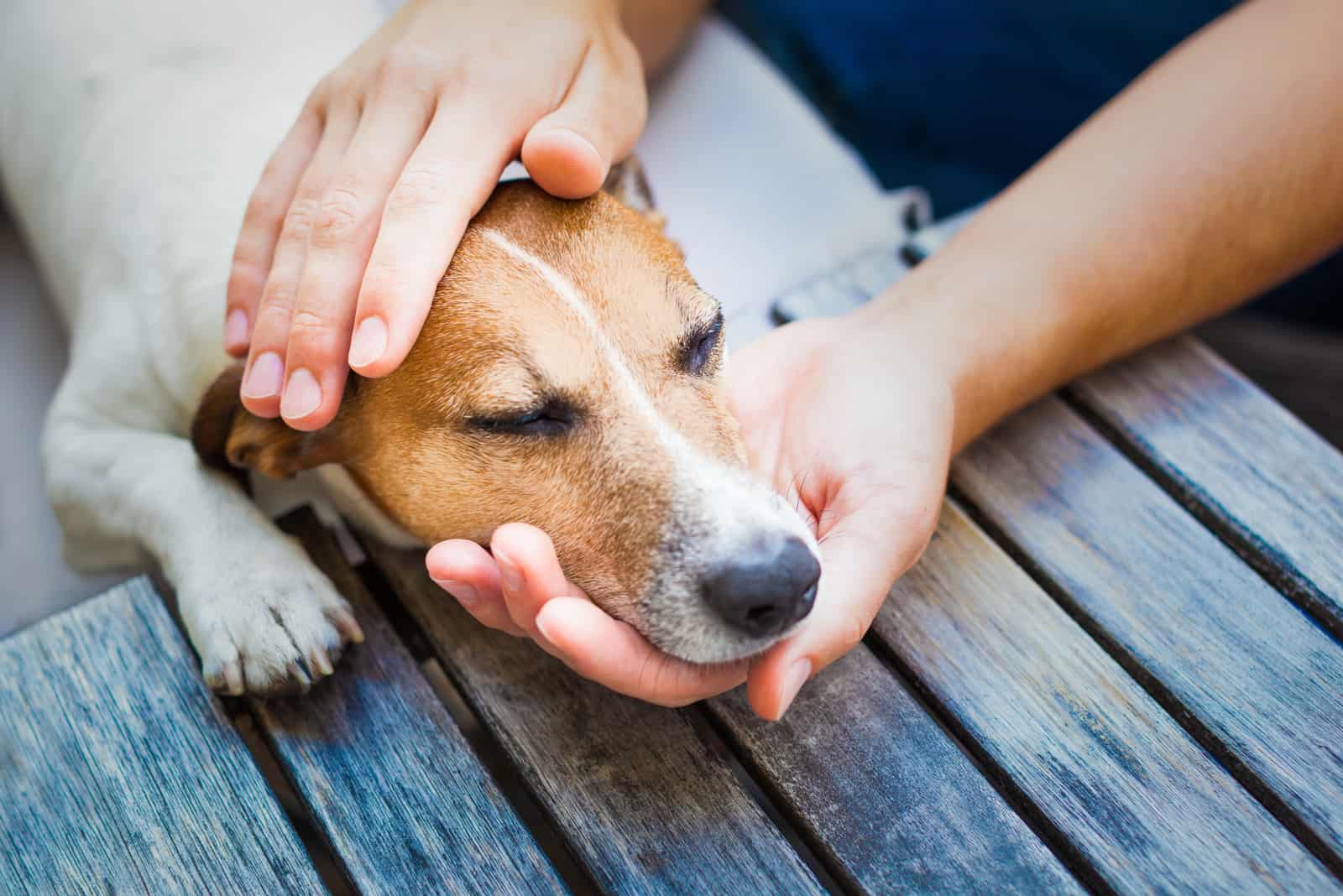
Gastroesophageal Reflux Disease (GERD) (or acid reflux) is a condition characterized by stomach acid frequently present in a dog’s esophagus. You’ve probably experienced it, too! Acid reflux leaves a burning sensation. If your dog could speak, he’d definitely tell you that.
You’ll notice if your dog has acid reflux if he refuses to eat, and acts like he is trying to swallow something invisible in his throat. Acid reflux also causes chest pain, and makes it difficult for a dog to swallow.
If you suspect your dog is suffering from acid reflux, you should see your vet. Acid from the stomach can severely damage the dog’s esophagus if not treated in time.
What Do You Do After Your Dog Vomits Yellow?
The first thing you need to do is not panic. Vomiting yellow bile doesn’t have to mean anything serious.
However, continuous vomiting may be a sign of some underlying health problems that I mentioned earlier.
Everyone talks about what causes a dog to throw up yellow bile, but rarely does anyone talk about what to do immediately after a dog vomits. Should you rush your dog to see the vet or should you stay at home?
It’s always a good idea to call in and ask your vet what to do. In most cases, especially if your dog is usually healthy, you’ll be advised to monitor the situation. If the throwing up continues, then you should come in for a checkup.
But, should you feed your dog his usual food, or should you keep him on a bland diet?
A bland diet is the answer! Basically, anything that won’t trigger an upset stomach will do.
Usually, vets recommend giving your dog cooked chicken without any bones or skin, or simple white rice. It should calm down the tummy, and line up the stomach so it doesn’t feel irritated anymore.
Remember… no fatty foods, and no sharp smells for a while until you feel like your dog is all better.
What Could I Do To Prevent My Dog From Vomiting Yellow Bile?
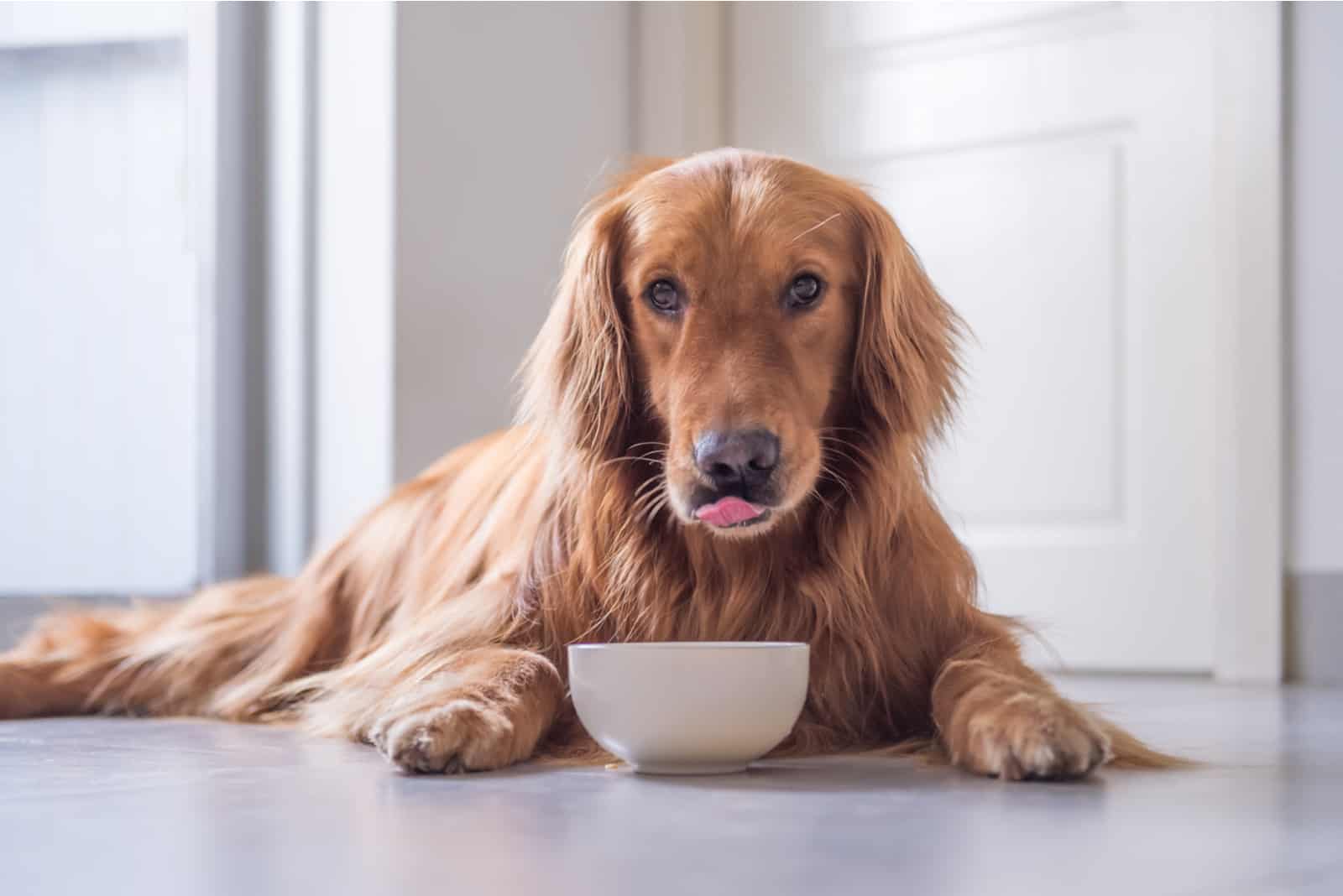
Prevention always saves the day. It’s better to be safe than sorry, so if you can, make sure you do everything in your power to stop your dog from vomiting yellow.
You can consult your vet for general guidance, but here are the most common ways of prevention.
Change Of Meals
It’s crucial to keep your dog’s stomach full in order to prevent it from vomiting bile.
This can be done by introducing more small meals throughout the day. Instead of only two major meals a day, you should serve your dog four meals, for example.
However, this doesn’t mean you should double the amount of food your dog is having on a daily basis. This simply means you’ll need to divide the total amount of kibble into four meals.
Also, check with your vet to see if your dog might need a change of diet. Maybe your Fido has a sensitive stomach, and he needs a special formula.
I have to remind you that introducing new dog food without consulting with your vet first could upset your dog’s stomach, especially if it’s a brand new formula. Any change in food should be done gradually by switching a certain amount of old kibble with new kibble until it’s all changed.
Hydratation
Every dog should take in enough water to keep his body functioning properly.
Hydratation should not lack; otherwise, serious changes in a dog’s body may occur, one of them being vomiting yellow bile.
So, next time you wonder, “Why is my dog throwing up yellow?”, ask yourself another question: Is my dog taking in enough water every day?
Lack of interest in water may signify other important health changes in a dog’s body.
Once your dog vomits, he’ll need to make up for the lost fluids. This usually means visiting the vet’s office for some IV fluids.
Can Home Remedies Treat My Dog From Throwing Up Yellow Bile?
As always, there are some natural remedies that could ease your dog’s problems. But, I suggest you consult your vet first. A quick phone call can help you decide whether marshmallow root or licorice will calm down your pup’s tummy.
Licorice
Licorice is already known for its great effects on heartburn. This remedy helps to coat the digestive tract and cool it down.
We use licorice glycerine extract to help fight vomiting yellow bile. They’re applied twice a day for as long as the vomiting continues, but no longer than 10 days. The amount of drops given on an empty stomach depends on how big or small your dog is.
The smallest pooches should take three drops, while large canines should take 15 drops. For other guidelines, consult your veterinarian.
Chamomile
The useful effects of chamomile are widely-known. Some say it’s the best remedy for an upset stomach. There are numerous tinctures and tea mixtures you can make with chamomile and other complementing herbs.
Chamomile will calm down any inflammation in your dog’s digestive tract. Brew chamomile tea, and let it steep for around half an hour before you give it to your dog to drink. Fido should drink chamomile tea two or three times a day until the inflammation stops.
But, don’t think you should serve your dog a bowl filled with chamomile tea. This treatment involves only a few tablespoons of tea a day. For example, small dog breeds should take around three teaspoons, while big dogs should take up to four tablespoons.
Meadowsweet
Painful tummies filled with acid can be treated with some meadowsweet.
You can either use a tincture or dried meadowsweet. Dried meadowsweet should be used with food twice a day. Your veterinarian should give you instructions on the amount needed for your dog.
If you use a tincture, you should give one drop of it for every ten pounds your dog has. Drop it in your dog’s mouth with some water twice a day.
Marshmallow Root
Another great herb is marshmallow root, which eases inflammation and decreases discomfort in the tummy.
You can use marshmallow capsules prescribed by your vet, or you can make an infusion. The dosage is the same as with chamomile tea.
When Is It Time To Visit The Vet?
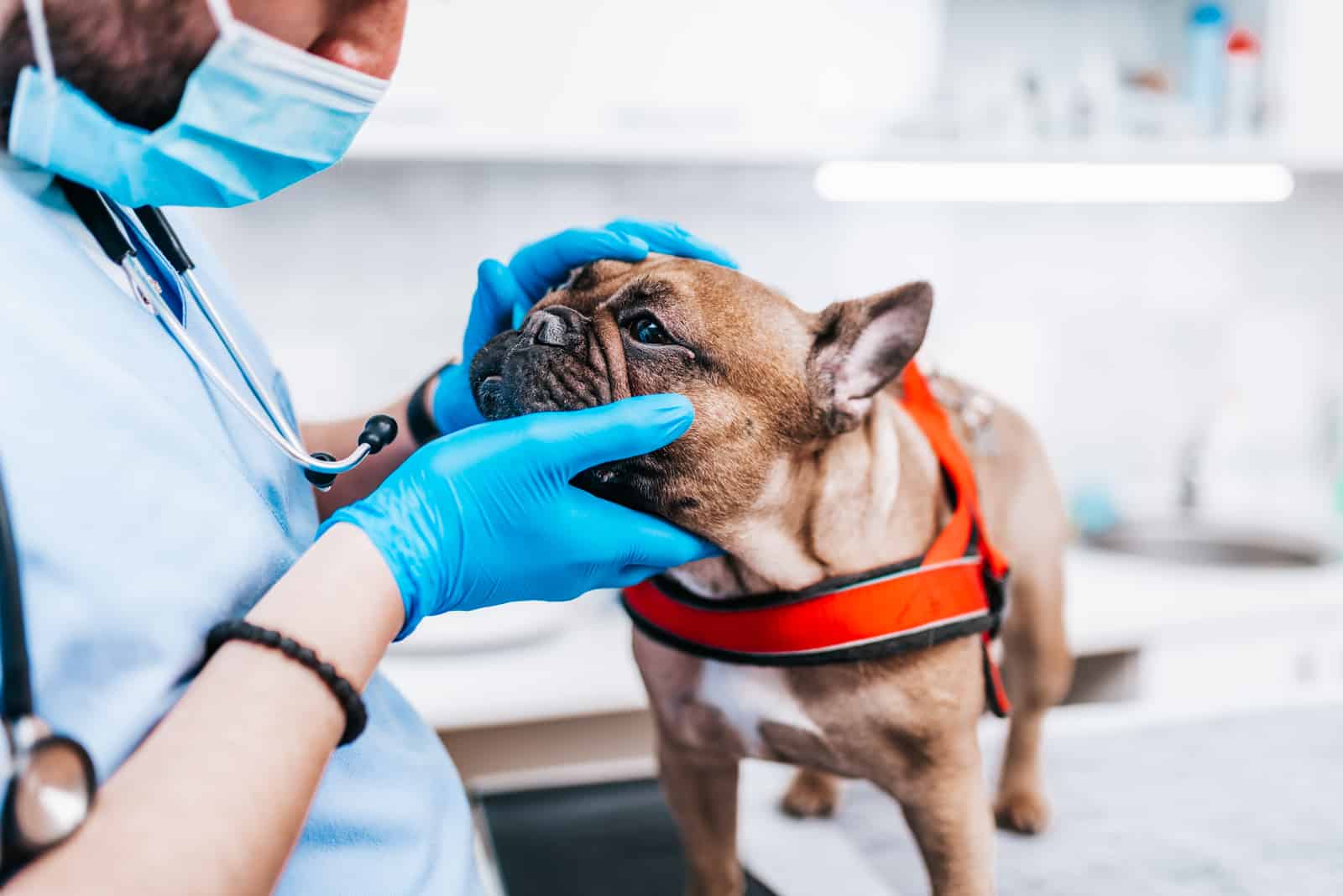
Although throwing up yellow bile is quite frequent with dogs of all breeds, there will come a time to visit the vet because home remedies won’t be helpful anymore. Of course, you shouldn’t let things get solved on their own because they won’t.
If you find yourself asking too often, “Why is my dog throwing up yellow?”, then it’s time to react. Frequent vomiting of yellow bile or foamy substance should raise some red flags.
There are several cases in which you should seek veterinary assistance.
Bloat
Bloat is also known as gastric dilatation and volvulus. This condition is very common in large dogs, and stands for a condition when the dog’s stomach twists.
Dogs tend to be greedy when it comes to food. They eat fast, and tend to inhale too much air. In such situations, the stomach will twist and close off all exits, if you know what I mean.
Your dog will start to throw up yellow bile or foamy substance, or even try to vomit without anything coming out – also known as dry heaving.
A clear sign of bloat is a tight tummy, pale gums, and general distress. Bloat is dangerous, and it must be treated immediately.
Pancreatitis
Pancreatitis is a condition that stands for the inflammation of the pancreas. It’s a severe condition that must be treated as soon as possible.
If your dog experiences lethargic behavior, loss of appetite, or abdominal pain, he might suffer from pancreatitis. It could either be chronic or acute pancreatitis.
In this case, your dog won’t be able to digest oils and fats, and thus, he’ll be vomiting yellow bile.
Parasite Infection
Parasites like Giardia can cause your dog to vomit yellow. This nasty parasite will make your dog feel nauseous and lethargic. Also, your pup might have diarrhea all night long.
The best way to determine if Giardia is present is to take a stool sample to your vet for a check.
Your Dog Swallowed Something
If your dog has swallowed up something and you don’t know why, then you should check out PupVine’s helpful article on inducing vomiting.
Our canine buddies sure love to chew on different items. Swallowed-up toys or other foreign objects can cause blockage, and your dog might react by vomiting yellow bile.
This requires immediate veterinary help to save the dog’s life, and in most cases, X-ray images need to be taken in order to see what Fido swallowed. Sometimes, it will show up in dog poop, but better safe than sorry.
To Sum Up…
Your dog’s health should be as equally important as your own. I absolutely understand why you ask, “Why is my dog throwing up yellow?” all the time. It’s not easy to see your Fido throwing up yellow or white foam. It definitely scares us to death!
When a dog throws up yellow bile, the most important thing is to keep your cool. If there aren’t any other symptoms, then vomiting can be tolerated.
However, you should not ignore it if it happens too often. You must find which of the common reasons stands behind the vomiting. Is it a liver disease? Did your dog swallow up something? Or, is your pooch allergic to some food?
A quick visit to the vet’s office will help you determine why your dog is throwing up. Although this throwing up isn’t considered to be life-threatening, it can still be a sign of some severe problems with your dog’s wellness.
Read Next:
• Dog Vomit Color Chart: 7 Shades Of Barf
• How To Make Dog Throw Up After Eating Chocolate
